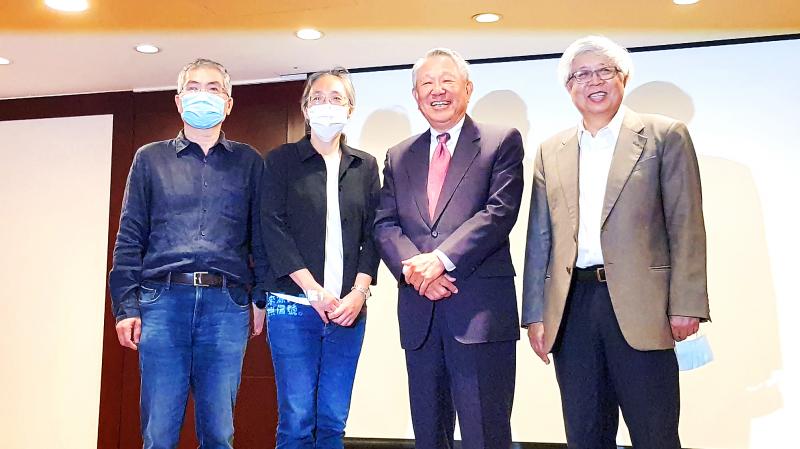Vaccine maker Adimmune Corp (國光生技) yesterday said it plans to start in August phase I clinical trials of its COVID-19 vaccine candidate, which effectively inhibited the growth of the novel coronavirus in preliminary animal tests last month.
Adimmune told a news conference in Taipei that it had designed and produced four prototypes of antigens to fight the virus based on its recombinant protein technology, and last month tested one prototype in a biosafety level 3 (BSL-3) lab at National Taiwan University (NTU).
After injecting the antigen into a few mice and seeing them generate antibodies, Adimmune extracted their plasma and placed it in another cell as well as the novel coronavirus to test the outcome, the company said.

Photo: Chien Hui-ju, Taipei Times
“The tests showed that the antibodies could inhibit the growth of the novel coronavirus and remained fully capable with a dilution of 1:640,” NTU Department of Clinical Laboratory Sciences and Medical Biotechnology professor Chang Sui-yuan (張淑媛) said.
The inhibition rate remained above 80 percent with a dilution of 1:1280, attesting to the strong effect of the vaccine candidate, Adimmune chairman Steve Chan (詹啟賢) said, adding that a flu vaccine is regarded as effective if its inhibition rate is higher than 80 percent with a dilution of 1:320.
The virus tested was from an isolated strain with the highest toxicity among NTU’s more than 20 isolated virus strains, Chang said.
“The tests gave us encouraging results and we feel confident. However, given that the novel coronavirus mutates, we need to run tests on more virus strains to see if the candidate will work against most of them,” she said.
The lab spent about one month setting up protocols and conducting tests, she added.
Adimmune does not know how long the vaccine candidate can protect humans from the virus, but would find out the answers in the clinical trials, Chan said.
The firm on Tuesday began the second stage of animal tests to see if the vaccine candidate would endanger mice and plans to complete the tests in October, he said.
While most vaccine developers have to wait for animal tests to be completed and for the results to be confirmed before moving on to human tests, Adimmune plans to expedite the process by applying to conduct human trials in August, Chan said.
Like other foreign regulators worldwide, Taiwan’s Food and Drug Administration has launched emergency use authorizations programs to speed up the development of a treatment for COVID-19, he said.
Adimmune has been included in the agency’s program and would be granted priority when applying for reviews or clinical trials, the company said.
After completing the animal tests’ interim analysis to make sure its candidate is safe, Adimmune would apply to conduct phase I clinical trials in August, and commence phase II and phase III trials in the first quarter next year, Chan said.
“We have to take some risks here for if the animal tests turn up negative, the phase I trial will have to stop,” he said.
The company’s goal is to start mass production of the vaccines in December if it gains approval of an emergency use authorization by the Taiwanese regulators, before gaining marketing approval next year, he said.

South Korea’s equity benchmark yesterday crossed a new milestone just a month after surpassing the once-unthinkable 5,000 mark as surging global memory demand powers the country’s biggest chipmakers. The KOSPI advanced as much as 2.6 percent to a record 6,123, with Samsung Electronics Co and SK Hynix Inc each gaining more than 2 percent. With the benchmark now up 45 percent this year, South Korea’s stock market capitalization has also moved past France’s, following last month’s overtaking of Germany’s. Long overlooked by foreign funds, despite being undervalued, South Korean stocks have now emerged as clear winners in the global market. The so-called “artificial intelligence

NEW IDENTITY: Known for its software, India has expanded into hardware, with its semiconductor industry growing from US$38bn in 2023 to US$45bn to US$50bn India on Saturday inaugurated its first semiconductor assembly and test facility, a milestone in the government’s push to reduce dependence on foreign chipmakers and stake a claim in a sector dominated by China. Indian Prime Minister Narendra Modi opened US firm Micron Technology Inc’s semiconductor assembly, test and packaging unit in his home state of Gujarat, hailing the “dawn of a new era” for India’s technology ambitions. “When young Indians look back in the future, they will see this decade as the turning point in our tech future,” Modi told the event, which was broadcast on his YouTube channel. The plant would convert

‘SEISMIC SHIFT’: The researcher forecast there would be about 1.1 billion mobile shipments this year, down from 1.26 billion the prior year and erasing years of gains The global smartphone market is expected to contract 12.9 percent this year due to the unprecedented memorychip shortage, marking “a crisis like no other,” researcher International Data Corp (IDC) said. The new forecast, a dramatic revision down from earlier estimates, gives the latest accounting of the ongoing memory crunch that is affecting every corner of the electronics industry. The demand for advanced memory to power artificial intelligence (AI) tasks has drained global supply until well into next year and jeopardizes the business model of many smartphone makers. IDC forecast about 1.1 billion mobile shipments this year, down from 1.26 billion the prior

People stand in a Pokemon store in Tokyo on Thursday. One of the world highest-grossing franchises is celebrated its 30th anniversary yesterday.